Sleep Deprivation and Its Impact on Diabetes Development: A Review
VerifiedAdded on 2022/11/18
|11
|2514
|369
Report
AI Summary
This report provides a comprehensive review of the existing scientific literature on the relationship between sleep deprivation and the increased risk of developing diabetes. The report synthesizes findings from multiple peer-reviewed journal articles, examining how insufficient sleep duration, poor sleep quality, and sleep disorders such as insomnia and sleep apnea are associated with metabolic disturbances, including insulin resistance, altered glucose metabolism, and increased levels of inflammatory markers. The report also explores the behavioral mechanisms, such as increased food consumption and impaired decision-making, that contribute to the link between sleep loss and diabetes. It highlights the potential consequences of this relationship, including increased risk of pre-diabetes, type 2 diabetes, and related complications. The report also discusses the impact of sleep on overall health and the implications of these findings for public health interventions and clinical practice. It emphasizes the importance of adequate sleep for maintaining metabolic health and preventing the onset of diabetes.
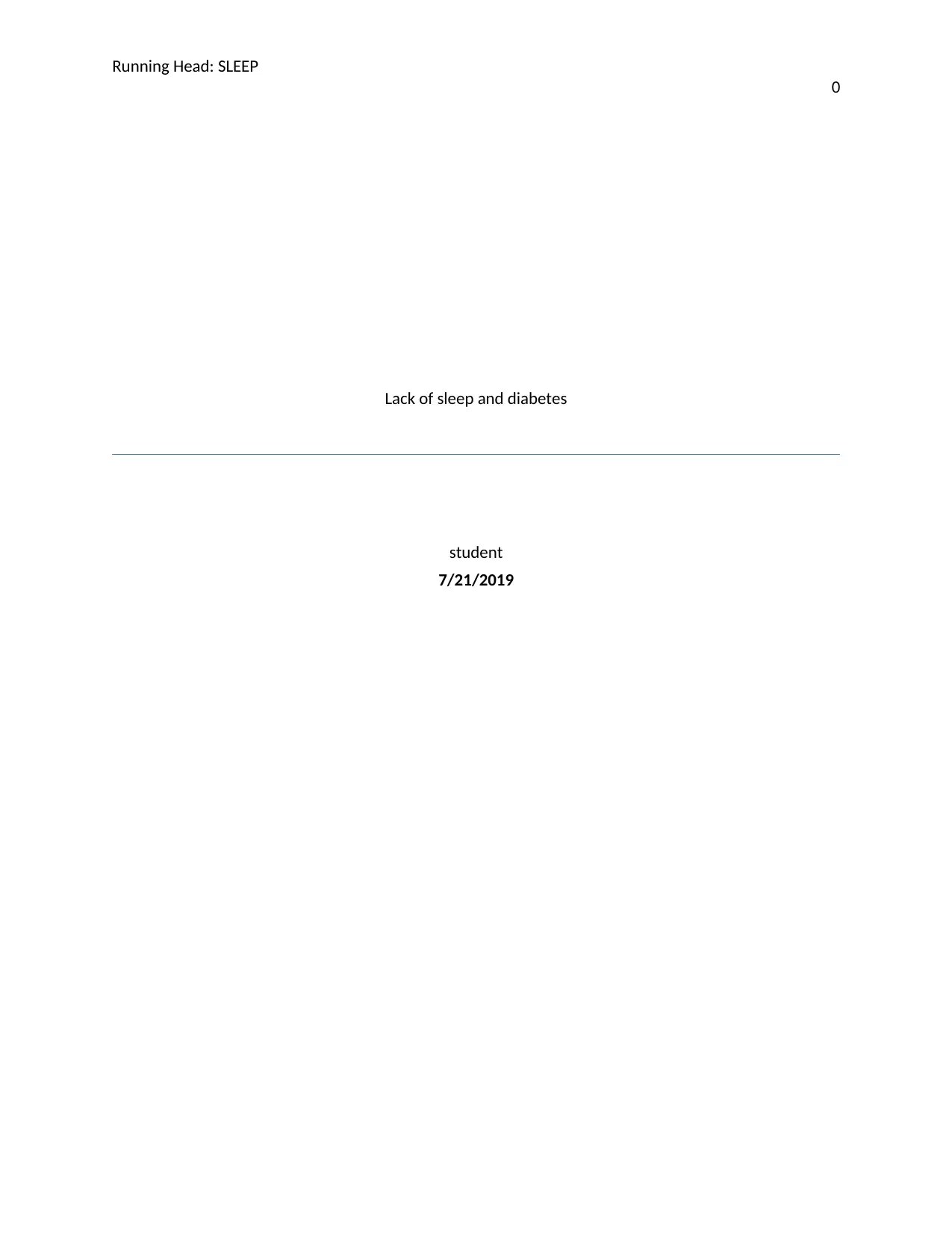
Running Head: SLEEP
0
Lack of sleep and diabetes
student
7/21/2019
0
Lack of sleep and diabetes
student
7/21/2019
Paraphrase This Document
Need a fresh take? Get an instant paraphrase of this document with our AI Paraphraser
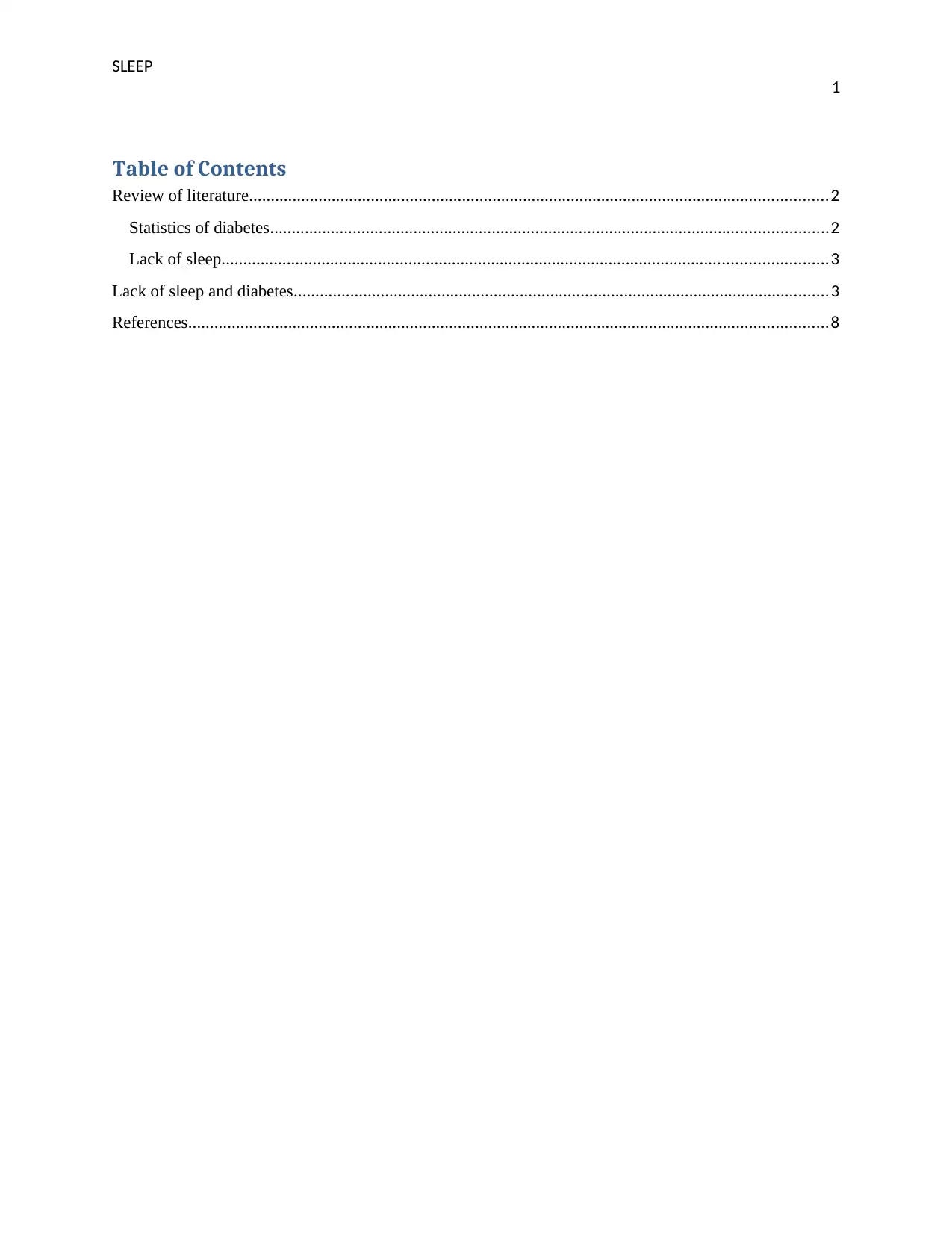
SLEEP
1
Table of Contents
Review of literature.....................................................................................................................................2
Statistics of diabetes................................................................................................................................2
Lack of sleep...........................................................................................................................................3
Lack of sleep and diabetes...........................................................................................................................3
References...................................................................................................................................................8
1
Table of Contents
Review of literature.....................................................................................................................................2
Statistics of diabetes................................................................................................................................2
Lack of sleep...........................................................................................................................................3
Lack of sleep and diabetes...........................................................................................................................3
References...................................................................................................................................................8
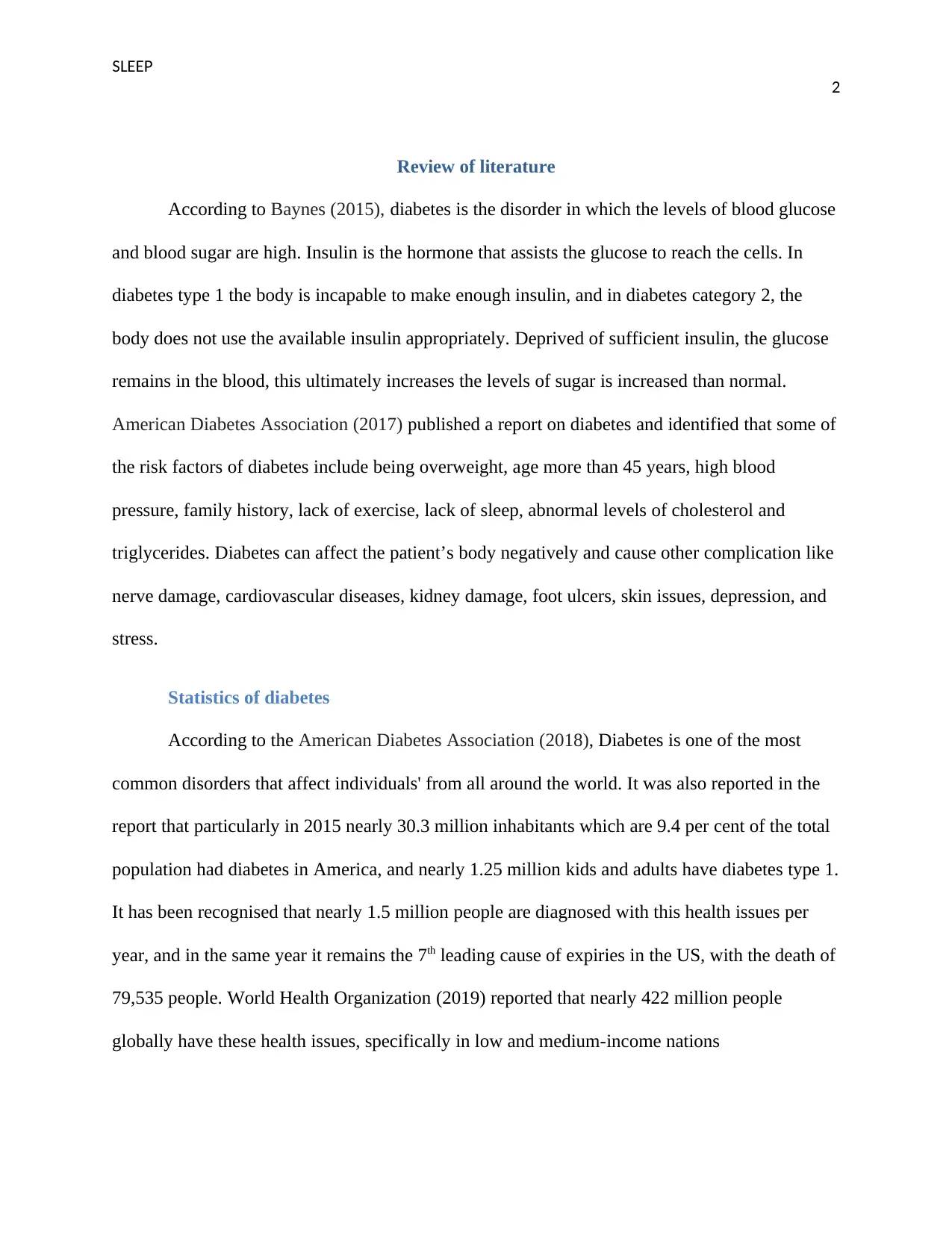
SLEEP
2
Review of literature
According to Baynes (2015), diabetes is the disorder in which the levels of blood glucose
and blood sugar are high. Insulin is the hormone that assists the glucose to reach the cells. In
diabetes type 1 the body is incapable to make enough insulin, and in diabetes category 2, the
body does not use the available insulin appropriately. Deprived of sufficient insulin, the glucose
remains in the blood, this ultimately increases the levels of sugar is increased than normal.
American Diabetes Association (2017) published a report on diabetes and identified that some of
the risk factors of diabetes include being overweight, age more than 45 years, high blood
pressure, family history, lack of exercise, lack of sleep, abnormal levels of cholesterol and
triglycerides. Diabetes can affect the patient’s body negatively and cause other complication like
nerve damage, cardiovascular diseases, kidney damage, foot ulcers, skin issues, depression, and
stress.
Statistics of diabetes
According to the American Diabetes Association (2018), Diabetes is one of the most
common disorders that affect individuals' from all around the world. It was also reported in the
report that particularly in 2015 nearly 30.3 million inhabitants which are 9.4 per cent of the total
population had diabetes in America, and nearly 1.25 million kids and adults have diabetes type 1.
It has been recognised that nearly 1.5 million people are diagnosed with this health issues per
year, and in the same year it remains the 7th leading cause of expiries in the US, with the death of
79,535 people. World Health Organization (2019) reported that nearly 422 million people
globally have these health issues, specifically in low and medium-income nations
2
Review of literature
According to Baynes (2015), diabetes is the disorder in which the levels of blood glucose
and blood sugar are high. Insulin is the hormone that assists the glucose to reach the cells. In
diabetes type 1 the body is incapable to make enough insulin, and in diabetes category 2, the
body does not use the available insulin appropriately. Deprived of sufficient insulin, the glucose
remains in the blood, this ultimately increases the levels of sugar is increased than normal.
American Diabetes Association (2017) published a report on diabetes and identified that some of
the risk factors of diabetes include being overweight, age more than 45 years, high blood
pressure, family history, lack of exercise, lack of sleep, abnormal levels of cholesterol and
triglycerides. Diabetes can affect the patient’s body negatively and cause other complication like
nerve damage, cardiovascular diseases, kidney damage, foot ulcers, skin issues, depression, and
stress.
Statistics of diabetes
According to the American Diabetes Association (2018), Diabetes is one of the most
common disorders that affect individuals' from all around the world. It was also reported in the
report that particularly in 2015 nearly 30.3 million inhabitants which are 9.4 per cent of the total
population had diabetes in America, and nearly 1.25 million kids and adults have diabetes type 1.
It has been recognised that nearly 1.5 million people are diagnosed with this health issues per
year, and in the same year it remains the 7th leading cause of expiries in the US, with the death of
79,535 people. World Health Organization (2019) reported that nearly 422 million people
globally have these health issues, specifically in low and medium-income nations
⊘ This is a preview!⊘
Do you want full access?
Subscribe today to unlock all pages.

Trusted by 1+ million students worldwide
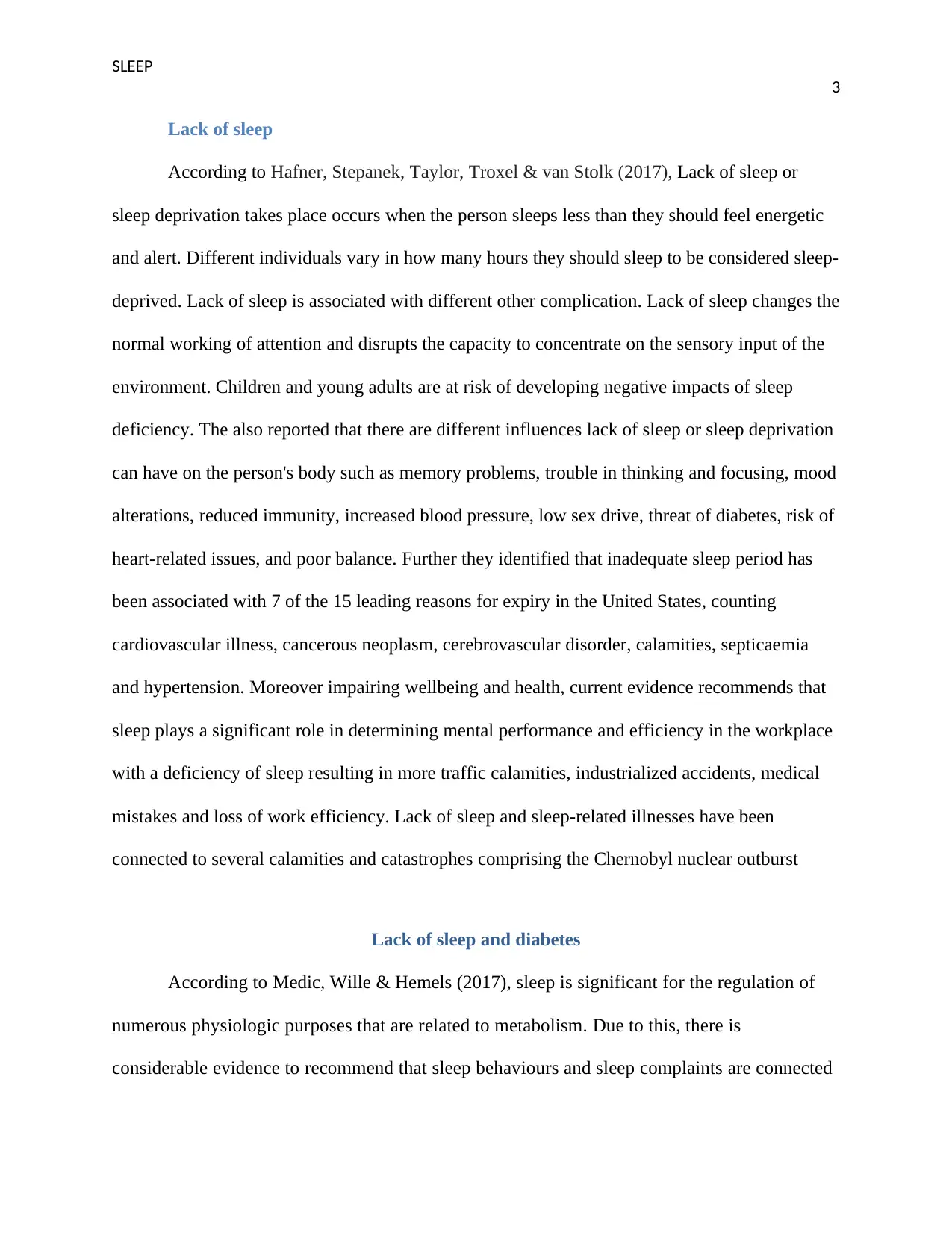
SLEEP
3
Lack of sleep
According to Hafner, Stepanek, Taylor, Troxel & van Stolk (2017), Lack of sleep or
sleep deprivation takes place occurs when the person sleeps less than they should feel energetic
and alert. Different individuals vary in how many hours they should sleep to be considered sleep-
deprived. Lack of sleep is associated with different other complication. Lack of sleep changes the
normal working of attention and disrupts the capacity to concentrate on the sensory input of the
environment. Children and young adults are at risk of developing negative impacts of sleep
deficiency. The also reported that there are different influences lack of sleep or sleep deprivation
can have on the person's body such as memory problems, trouble in thinking and focusing, mood
alterations, reduced immunity, increased blood pressure, low sex drive, threat of diabetes, risk of
heart-related issues, and poor balance. Further they identified that inadequate sleep period has
been associated with 7 of the 15 leading reasons for expiry in the United States, counting
cardiovascular illness, cancerous neoplasm, cerebrovascular disorder, calamities, septicaemia
and hypertension. Moreover impairing wellbeing and health, current evidence recommends that
sleep plays a significant role in determining mental performance and efficiency in the workplace
with a deficiency of sleep resulting in more traffic calamities, industrialized accidents, medical
mistakes and loss of work efficiency. Lack of sleep and sleep-related illnesses have been
connected to several calamities and catastrophes comprising the Chernobyl nuclear outburst
Lack of sleep and diabetes
According to Medic, Wille & Hemels (2017), sleep is significant for the regulation of
numerous physiologic purposes that are related to metabolism. Due to this, there is
considerable evidence to recommend that sleep behaviours and sleep complaints are connected
3
Lack of sleep
According to Hafner, Stepanek, Taylor, Troxel & van Stolk (2017), Lack of sleep or
sleep deprivation takes place occurs when the person sleeps less than they should feel energetic
and alert. Different individuals vary in how many hours they should sleep to be considered sleep-
deprived. Lack of sleep is associated with different other complication. Lack of sleep changes the
normal working of attention and disrupts the capacity to concentrate on the sensory input of the
environment. Children and young adults are at risk of developing negative impacts of sleep
deficiency. The also reported that there are different influences lack of sleep or sleep deprivation
can have on the person's body such as memory problems, trouble in thinking and focusing, mood
alterations, reduced immunity, increased blood pressure, low sex drive, threat of diabetes, risk of
heart-related issues, and poor balance. Further they identified that inadequate sleep period has
been associated with 7 of the 15 leading reasons for expiry in the United States, counting
cardiovascular illness, cancerous neoplasm, cerebrovascular disorder, calamities, septicaemia
and hypertension. Moreover impairing wellbeing and health, current evidence recommends that
sleep plays a significant role in determining mental performance and efficiency in the workplace
with a deficiency of sleep resulting in more traffic calamities, industrialized accidents, medical
mistakes and loss of work efficiency. Lack of sleep and sleep-related illnesses have been
connected to several calamities and catastrophes comprising the Chernobyl nuclear outburst
Lack of sleep and diabetes
According to Medic, Wille & Hemels (2017), sleep is significant for the regulation of
numerous physiologic purposes that are related to metabolism. Due to this, there is
considerable evidence to recommend that sleep behaviours and sleep complaints are connected
Paraphrase This Document
Need a fresh take? Get an instant paraphrase of this document with our AI Paraphraser
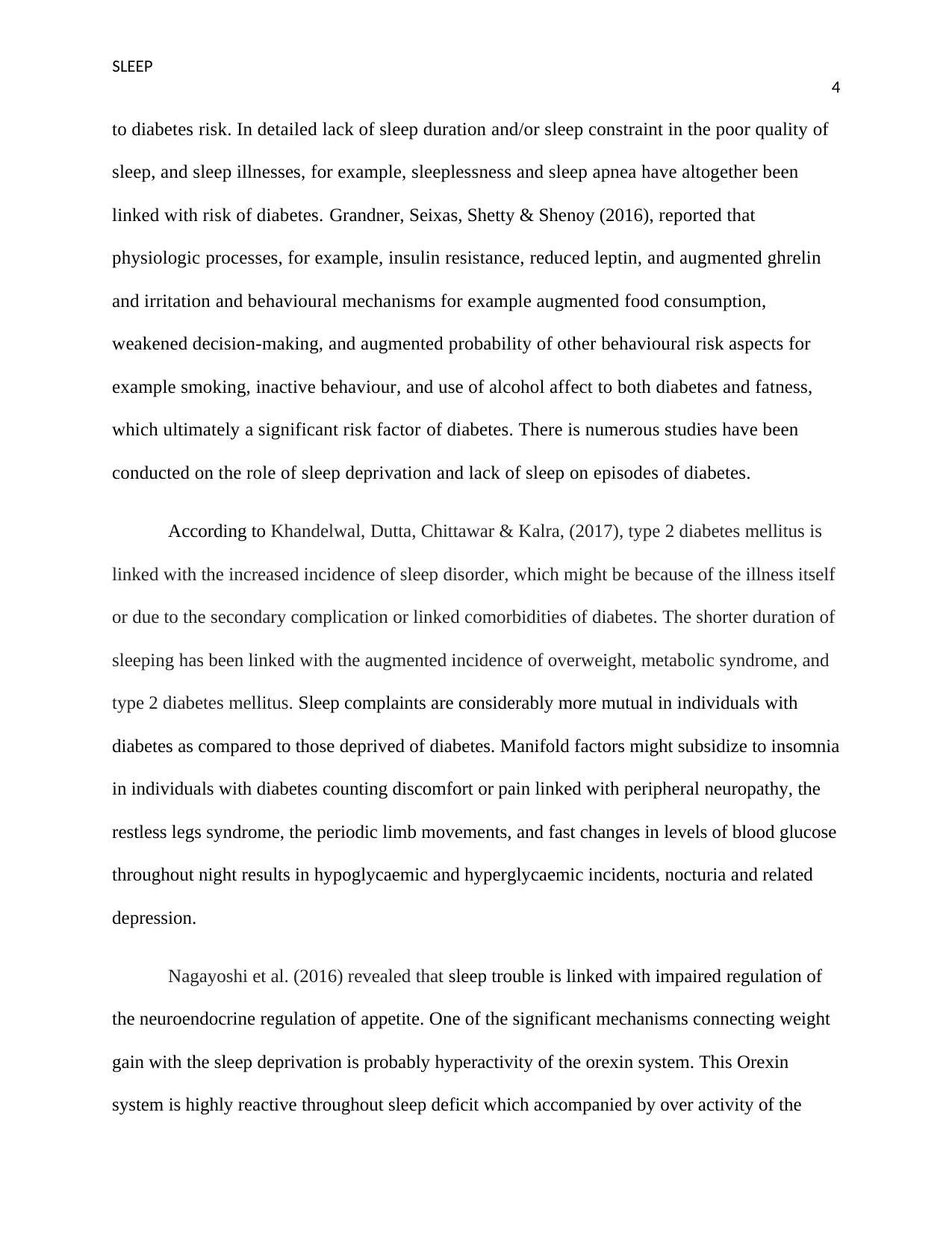
SLEEP
4
to diabetes risk. In detailed lack of sleep duration and/or sleep constraint in the poor quality of
sleep, and sleep illnesses, for example, sleeplessness and sleep apnea have altogether been
linked with risk of diabetes. Grandner, Seixas, Shetty & Shenoy (2016), reported that
physiologic processes, for example, insulin resistance, reduced leptin, and augmented ghrelin
and irritation and behavioural mechanisms for example augmented food consumption,
weakened decision-making, and augmented probability of other behavioural risk aspects for
example smoking, inactive behaviour, and use of alcohol affect to both diabetes and fatness,
which ultimately a significant risk factor of diabetes. There is numerous studies have been
conducted on the role of sleep deprivation and lack of sleep on episodes of diabetes.
According to Khandelwal, Dutta, Chittawar & Kalra, (2017), type 2 diabetes mellitus is
linked with the increased incidence of sleep disorder, which might be because of the illness itself
or due to the secondary complication or linked comorbidities of diabetes. The shorter duration of
sleeping has been linked with the augmented incidence of overweight, metabolic syndrome, and
type 2 diabetes mellitus. Sleep complaints are considerably more mutual in individuals with
diabetes as compared to those deprived of diabetes. Manifold factors might subsidize to insomnia
in individuals with diabetes counting discomfort or pain linked with peripheral neuropathy, the
restless legs syndrome, the periodic limb movements, and fast changes in levels of blood glucose
throughout night results in hypoglycaemic and hyperglycaemic incidents, nocturia and related
depression.
Nagayoshi et al. (2016) revealed that sleep trouble is linked with impaired regulation of
the neuroendocrine regulation of appetite. One of the significant mechanisms connecting weight
gain with the sleep deprivation is probably hyperactivity of the orexin system. This Orexin
system is highly reactive throughout sleep deficit which accompanied by over activity of the
4
to diabetes risk. In detailed lack of sleep duration and/or sleep constraint in the poor quality of
sleep, and sleep illnesses, for example, sleeplessness and sleep apnea have altogether been
linked with risk of diabetes. Grandner, Seixas, Shetty & Shenoy (2016), reported that
physiologic processes, for example, insulin resistance, reduced leptin, and augmented ghrelin
and irritation and behavioural mechanisms for example augmented food consumption,
weakened decision-making, and augmented probability of other behavioural risk aspects for
example smoking, inactive behaviour, and use of alcohol affect to both diabetes and fatness,
which ultimately a significant risk factor of diabetes. There is numerous studies have been
conducted on the role of sleep deprivation and lack of sleep on episodes of diabetes.
According to Khandelwal, Dutta, Chittawar & Kalra, (2017), type 2 diabetes mellitus is
linked with the increased incidence of sleep disorder, which might be because of the illness itself
or due to the secondary complication or linked comorbidities of diabetes. The shorter duration of
sleeping has been linked with the augmented incidence of overweight, metabolic syndrome, and
type 2 diabetes mellitus. Sleep complaints are considerably more mutual in individuals with
diabetes as compared to those deprived of diabetes. Manifold factors might subsidize to insomnia
in individuals with diabetes counting discomfort or pain linked with peripheral neuropathy, the
restless legs syndrome, the periodic limb movements, and fast changes in levels of blood glucose
throughout night results in hypoglycaemic and hyperglycaemic incidents, nocturia and related
depression.
Nagayoshi et al. (2016) revealed that sleep trouble is linked with impaired regulation of
the neuroendocrine regulation of appetite. One of the significant mechanisms connecting weight
gain with the sleep deprivation is probably hyperactivity of the orexin system. This Orexin
system is highly reactive throughout sleep deficit which accompanied by over activity of the
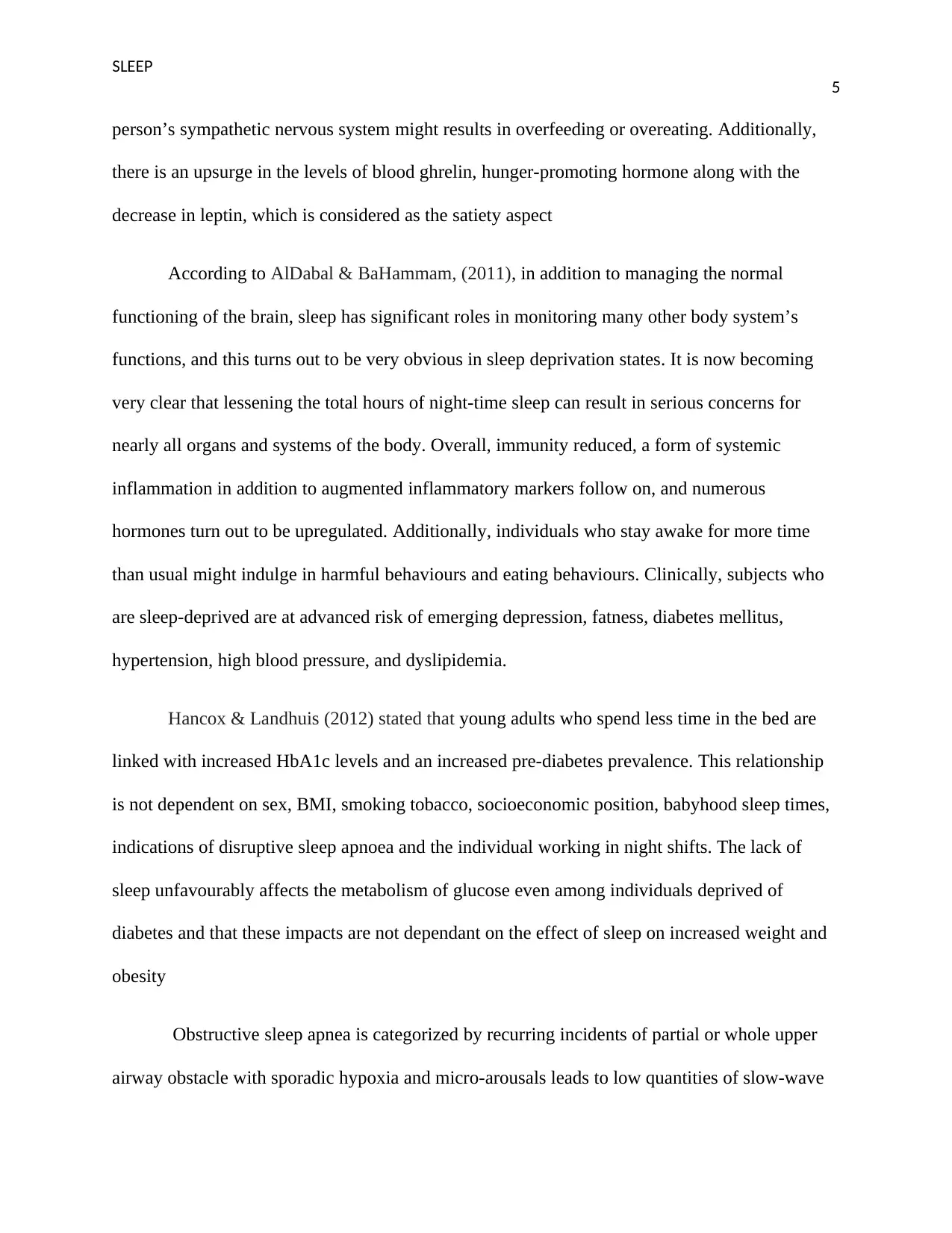
SLEEP
5
person’s sympathetic nervous system might results in overfeeding or overeating. Additionally,
there is an upsurge in the levels of blood ghrelin, hunger-promoting hormone along with the
decrease in leptin, which is considered as the satiety aspect
According to AlDabal & BaHammam, (2011), in addition to managing the normal
functioning of the brain, sleep has significant roles in monitoring many other body system’s
functions, and this turns out to be very obvious in sleep deprivation states. It is now becoming
very clear that lessening the total hours of night-time sleep can result in serious concerns for
nearly all organs and systems of the body. Overall, immunity reduced, a form of systemic
inflammation in addition to augmented inflammatory markers follow on, and numerous
hormones turn out to be upregulated. Additionally, individuals who stay awake for more time
than usual might indulge in harmful behaviours and eating behaviours. Clinically, subjects who
are sleep-deprived are at advanced risk of emerging depression, fatness, diabetes mellitus,
hypertension, high blood pressure, and dyslipidemia.
Hancox & Landhuis (2012) stated that young adults who spend less time in the bed are
linked with increased HbA1c levels and an increased pre-diabetes prevalence. This relationship
is not dependent on sex, BMI, smoking tobacco, socioeconomic position, babyhood sleep times,
indications of disruptive sleep apnoea and the individual working in night shifts. The lack of
sleep unfavourably affects the metabolism of glucose even among individuals deprived of
diabetes and that these impacts are not dependant on the effect of sleep on increased weight and
obesity
Obstructive sleep apnea is categorized by recurring incidents of partial or whole upper
airway obstacle with sporadic hypoxia and micro-arousals leads to low quantities of slow-wave
5
person’s sympathetic nervous system might results in overfeeding or overeating. Additionally,
there is an upsurge in the levels of blood ghrelin, hunger-promoting hormone along with the
decrease in leptin, which is considered as the satiety aspect
According to AlDabal & BaHammam, (2011), in addition to managing the normal
functioning of the brain, sleep has significant roles in monitoring many other body system’s
functions, and this turns out to be very obvious in sleep deprivation states. It is now becoming
very clear that lessening the total hours of night-time sleep can result in serious concerns for
nearly all organs and systems of the body. Overall, immunity reduced, a form of systemic
inflammation in addition to augmented inflammatory markers follow on, and numerous
hormones turn out to be upregulated. Additionally, individuals who stay awake for more time
than usual might indulge in harmful behaviours and eating behaviours. Clinically, subjects who
are sleep-deprived are at advanced risk of emerging depression, fatness, diabetes mellitus,
hypertension, high blood pressure, and dyslipidemia.
Hancox & Landhuis (2012) stated that young adults who spend less time in the bed are
linked with increased HbA1c levels and an increased pre-diabetes prevalence. This relationship
is not dependent on sex, BMI, smoking tobacco, socioeconomic position, babyhood sleep times,
indications of disruptive sleep apnoea and the individual working in night shifts. The lack of
sleep unfavourably affects the metabolism of glucose even among individuals deprived of
diabetes and that these impacts are not dependant on the effect of sleep on increased weight and
obesity
Obstructive sleep apnea is categorized by recurring incidents of partial or whole upper
airway obstacle with sporadic hypoxia and micro-arousals leads to low quantities of slow-wave
⊘ This is a preview!⊘
Do you want full access?
Subscribe today to unlock all pages.

Trusted by 1+ million students worldwide
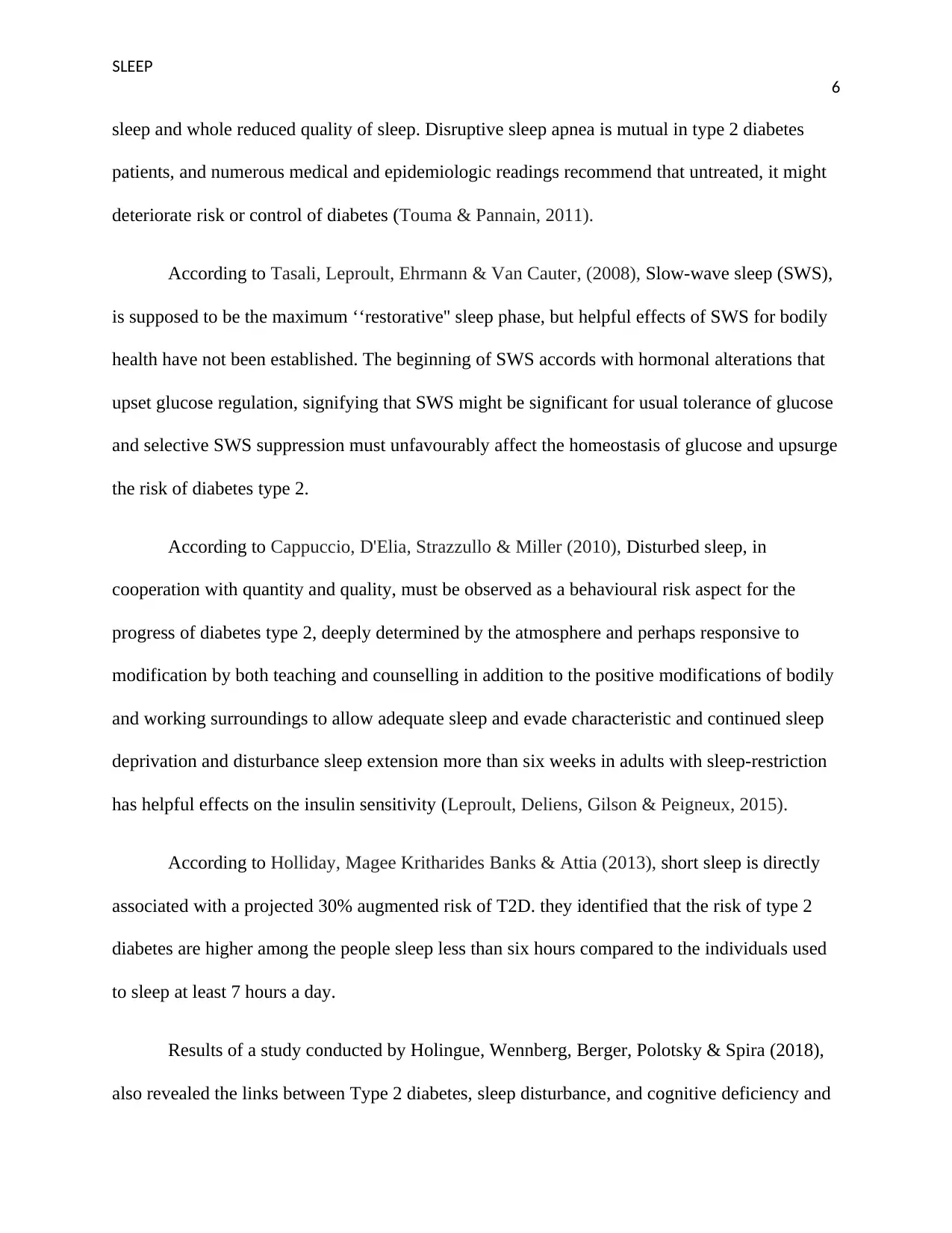
SLEEP
6
sleep and whole reduced quality of sleep. Disruptive sleep apnea is mutual in type 2 diabetes
patients, and numerous medical and epidemiologic readings recommend that untreated, it might
deteriorate risk or control of diabetes (Touma & Pannain, 2011).
According to Tasali, Leproult, Ehrmann & Van Cauter, (2008), Slow-wave sleep (SWS),
is supposed to be the maximum ‘‘restorative'' sleep phase, but helpful effects of SWS for bodily
health have not been established. The beginning of SWS accords with hormonal alterations that
upset glucose regulation, signifying that SWS might be significant for usual tolerance of glucose
and selective SWS suppression must unfavourably affect the homeostasis of glucose and upsurge
the risk of diabetes type 2.
According to Cappuccio, D'Elia, Strazzullo & Miller (2010), Disturbed sleep, in
cooperation with quantity and quality, must be observed as a behavioural risk aspect for the
progress of diabetes type 2, deeply determined by the atmosphere and perhaps responsive to
modification by both teaching and counselling in addition to the positive modifications of bodily
and working surroundings to allow adequate sleep and evade characteristic and continued sleep
deprivation and disturbance sleep extension more than six weeks in adults with sleep-restriction
has helpful effects on the insulin sensitivity (Leproult, Deliens, Gilson & Peigneux, 2015).
According to Holliday, Magee Kritharides Banks & Attia (2013), short sleep is directly
associated with a projected 30% augmented risk of T2D. they identified that the risk of type 2
diabetes are higher among the people sleep less than six hours compared to the individuals used
to sleep at least 7 hours a day.
Results of a study conducted by Holingue, Wennberg, Berger, Polotsky & Spira (2018),
also revealed the links between Type 2 diabetes, sleep disturbance, and cognitive deficiency and
6
sleep and whole reduced quality of sleep. Disruptive sleep apnea is mutual in type 2 diabetes
patients, and numerous medical and epidemiologic readings recommend that untreated, it might
deteriorate risk or control of diabetes (Touma & Pannain, 2011).
According to Tasali, Leproult, Ehrmann & Van Cauter, (2008), Slow-wave sleep (SWS),
is supposed to be the maximum ‘‘restorative'' sleep phase, but helpful effects of SWS for bodily
health have not been established. The beginning of SWS accords with hormonal alterations that
upset glucose regulation, signifying that SWS might be significant for usual tolerance of glucose
and selective SWS suppression must unfavourably affect the homeostasis of glucose and upsurge
the risk of diabetes type 2.
According to Cappuccio, D'Elia, Strazzullo & Miller (2010), Disturbed sleep, in
cooperation with quantity and quality, must be observed as a behavioural risk aspect for the
progress of diabetes type 2, deeply determined by the atmosphere and perhaps responsive to
modification by both teaching and counselling in addition to the positive modifications of bodily
and working surroundings to allow adequate sleep and evade characteristic and continued sleep
deprivation and disturbance sleep extension more than six weeks in adults with sleep-restriction
has helpful effects on the insulin sensitivity (Leproult, Deliens, Gilson & Peigneux, 2015).
According to Holliday, Magee Kritharides Banks & Attia (2013), short sleep is directly
associated with a projected 30% augmented risk of T2D. they identified that the risk of type 2
diabetes are higher among the people sleep less than six hours compared to the individuals used
to sleep at least 7 hours a day.
Results of a study conducted by Holingue, Wennberg, Berger, Polotsky & Spira (2018),
also revealed the links between Type 2 diabetes, sleep disturbance, and cognitive deficiency and
Paraphrase This Document
Need a fresh take? Get an instant paraphrase of this document with our AI Paraphraser
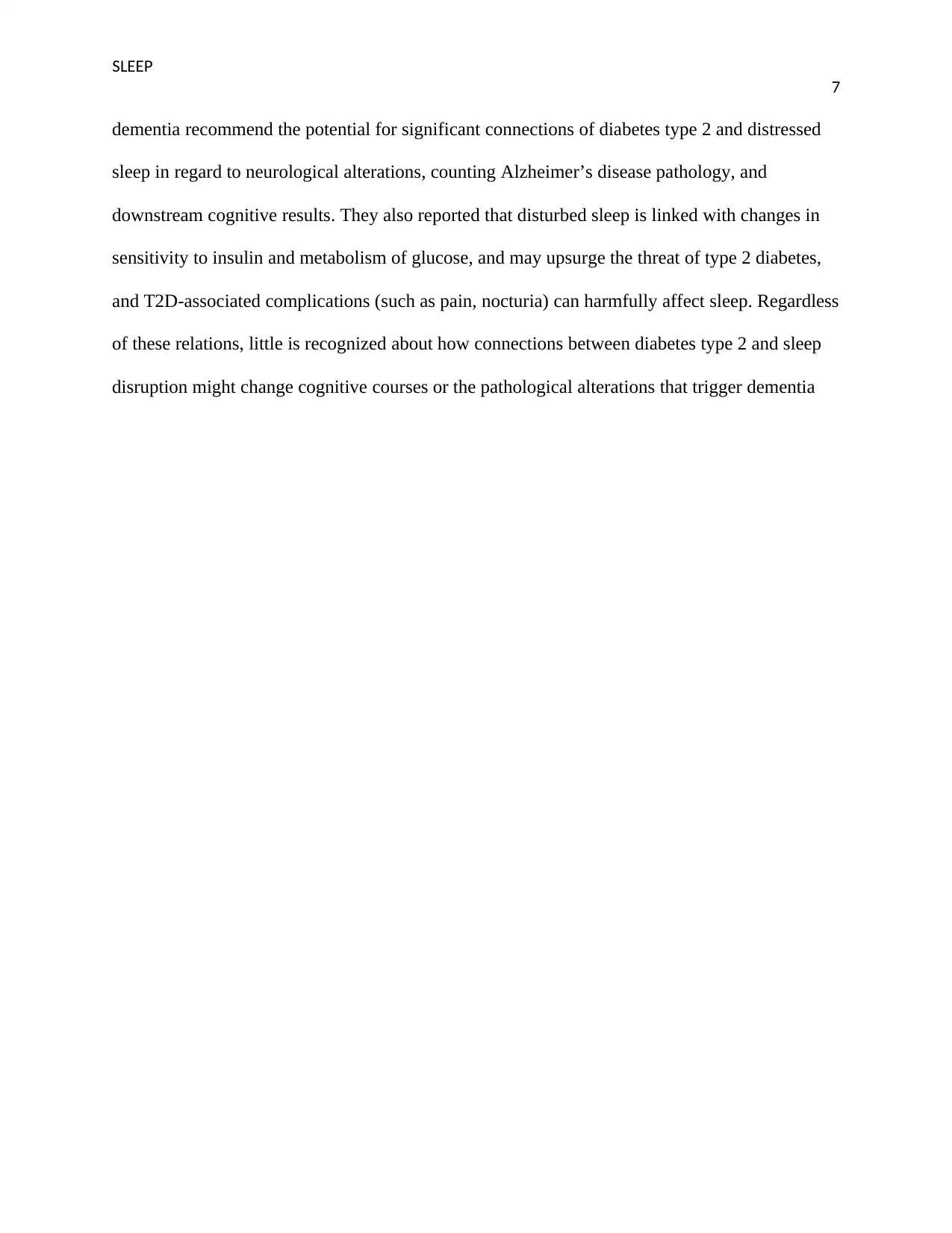
SLEEP
7
dementia recommend the potential for significant connections of diabetes type 2 and distressed
sleep in regard to neurological alterations, counting Alzheimer’s disease pathology, and
downstream cognitive results. They also reported that disturbed sleep is linked with changes in
sensitivity to insulin and metabolism of glucose, and may upsurge the threat of type 2 diabetes,
and T2D-associated complications (such as pain, nocturia) can harmfully affect sleep. Regardless
of these relations, little is recognized about how connections between diabetes type 2 and sleep
disruption might change cognitive courses or the pathological alterations that trigger dementia
7
dementia recommend the potential for significant connections of diabetes type 2 and distressed
sleep in regard to neurological alterations, counting Alzheimer’s disease pathology, and
downstream cognitive results. They also reported that disturbed sleep is linked with changes in
sensitivity to insulin and metabolism of glucose, and may upsurge the threat of type 2 diabetes,
and T2D-associated complications (such as pain, nocturia) can harmfully affect sleep. Regardless
of these relations, little is recognized about how connections between diabetes type 2 and sleep
disruption might change cognitive courses or the pathological alterations that trigger dementia
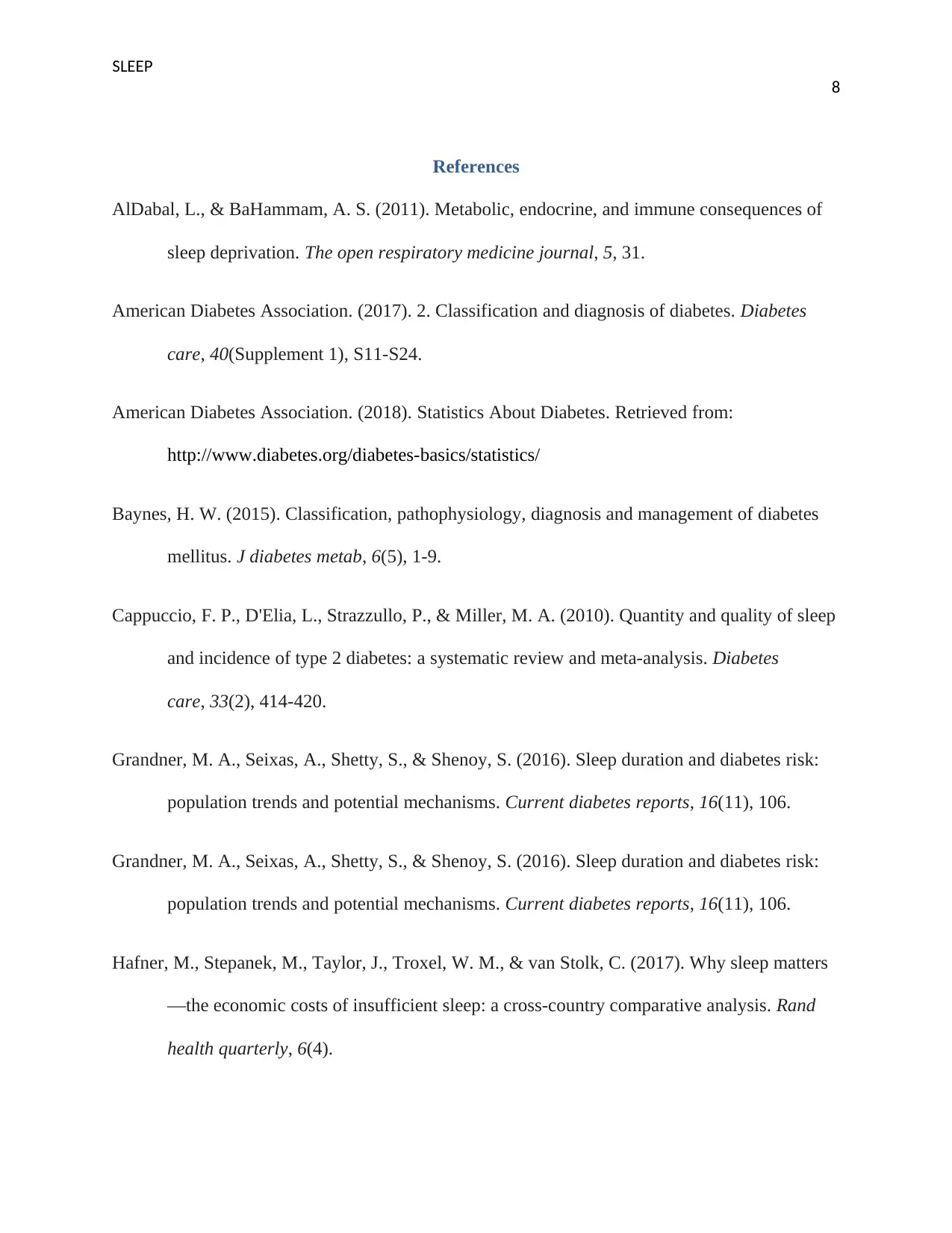
SLEEP
8
References
AlDabal, L., & BaHammam, A. S. (2011). Metabolic, endocrine, and immune consequences of
sleep deprivation. The open respiratory medicine journal, 5, 31.
American Diabetes Association. (2017). 2. Classification and diagnosis of diabetes. Diabetes
care, 40(Supplement 1), S11-S24.
American Diabetes Association. (2018). Statistics About Diabetes. Retrieved from:
http://www.diabetes.org/diabetes-basics/statistics/
Baynes, H. W. (2015). Classification, pathophysiology, diagnosis and management of diabetes
mellitus. J diabetes metab, 6(5), 1-9.
Cappuccio, F. P., D'Elia, L., Strazzullo, P., & Miller, M. A. (2010). Quantity and quality of sleep
and incidence of type 2 diabetes: a systematic review and meta-analysis. Diabetes
care, 33(2), 414-420.
Grandner, M. A., Seixas, A., Shetty, S., & Shenoy, S. (2016). Sleep duration and diabetes risk:
population trends and potential mechanisms. Current diabetes reports, 16(11), 106.
Grandner, M. A., Seixas, A., Shetty, S., & Shenoy, S. (2016). Sleep duration and diabetes risk:
population trends and potential mechanisms. Current diabetes reports, 16(11), 106.
Hafner, M., Stepanek, M., Taylor, J., Troxel, W. M., & van Stolk, C. (2017). Why sleep matters
—the economic costs of insufficient sleep: a cross-country comparative analysis. Rand
health quarterly, 6(4).
8
References
AlDabal, L., & BaHammam, A. S. (2011). Metabolic, endocrine, and immune consequences of
sleep deprivation. The open respiratory medicine journal, 5, 31.
American Diabetes Association. (2017). 2. Classification and diagnosis of diabetes. Diabetes
care, 40(Supplement 1), S11-S24.
American Diabetes Association. (2018). Statistics About Diabetes. Retrieved from:
http://www.diabetes.org/diabetes-basics/statistics/
Baynes, H. W. (2015). Classification, pathophysiology, diagnosis and management of diabetes
mellitus. J diabetes metab, 6(5), 1-9.
Cappuccio, F. P., D'Elia, L., Strazzullo, P., & Miller, M. A. (2010). Quantity and quality of sleep
and incidence of type 2 diabetes: a systematic review and meta-analysis. Diabetes
care, 33(2), 414-420.
Grandner, M. A., Seixas, A., Shetty, S., & Shenoy, S. (2016). Sleep duration and diabetes risk:
population trends and potential mechanisms. Current diabetes reports, 16(11), 106.
Grandner, M. A., Seixas, A., Shetty, S., & Shenoy, S. (2016). Sleep duration and diabetes risk:
population trends and potential mechanisms. Current diabetes reports, 16(11), 106.
Hafner, M., Stepanek, M., Taylor, J., Troxel, W. M., & van Stolk, C. (2017). Why sleep matters
—the economic costs of insufficient sleep: a cross-country comparative analysis. Rand
health quarterly, 6(4).
⊘ This is a preview!⊘
Do you want full access?
Subscribe today to unlock all pages.

Trusted by 1+ million students worldwide
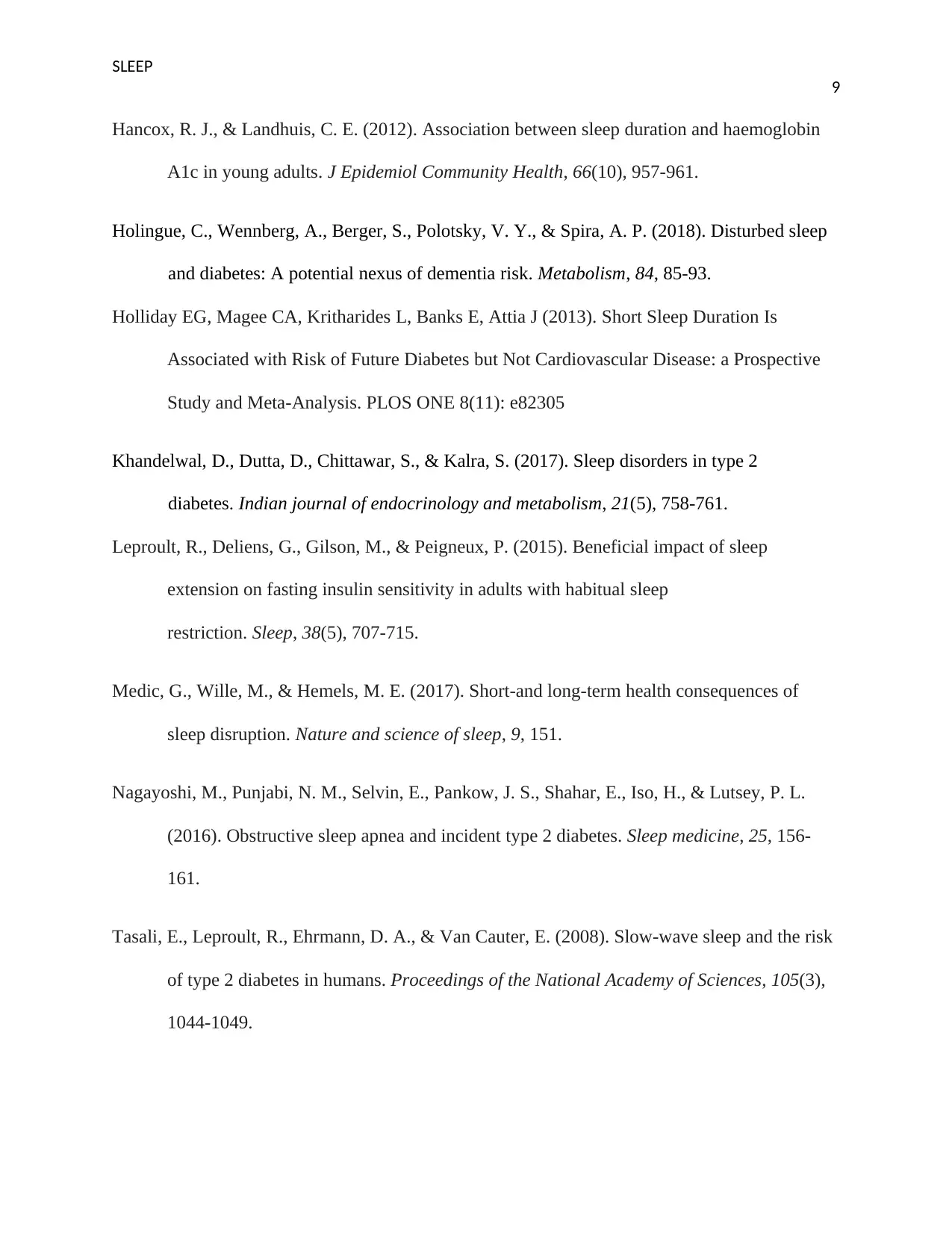
SLEEP
9
Hancox, R. J., & Landhuis, C. E. (2012). Association between sleep duration and haemoglobin
A1c in young adults. J Epidemiol Community Health, 66(10), 957-961.
Holingue, C., Wennberg, A., Berger, S., Polotsky, V. Y., & Spira, A. P. (2018). Disturbed sleep
and diabetes: A potential nexus of dementia risk. Metabolism, 84, 85-93.
Holliday EG, Magee CA, Kritharides L, Banks E, Attia J (2013). Short Sleep Duration Is
Associated with Risk of Future Diabetes but Not Cardiovascular Disease: a Prospective
Study and Meta-Analysis. PLOS ONE 8(11): e82305
Khandelwal, D., Dutta, D., Chittawar, S., & Kalra, S. (2017). Sleep disorders in type 2
diabetes. Indian journal of endocrinology and metabolism, 21(5), 758-761.
Leproult, R., Deliens, G., Gilson, M., & Peigneux, P. (2015). Beneficial impact of sleep
extension on fasting insulin sensitivity in adults with habitual sleep
restriction. Sleep, 38(5), 707-715.
Medic, G., Wille, M., & Hemels, M. E. (2017). Short-and long-term health consequences of
sleep disruption. Nature and science of sleep, 9, 151.
Nagayoshi, M., Punjabi, N. M., Selvin, E., Pankow, J. S., Shahar, E., Iso, H., & Lutsey, P. L.
(2016). Obstructive sleep apnea and incident type 2 diabetes. Sleep medicine, 25, 156-
161.
Tasali, E., Leproult, R., Ehrmann, D. A., & Van Cauter, E. (2008). Slow-wave sleep and the risk
of type 2 diabetes in humans. Proceedings of the National Academy of Sciences, 105(3),
1044-1049.
9
Hancox, R. J., & Landhuis, C. E. (2012). Association between sleep duration and haemoglobin
A1c in young adults. J Epidemiol Community Health, 66(10), 957-961.
Holingue, C., Wennberg, A., Berger, S., Polotsky, V. Y., & Spira, A. P. (2018). Disturbed sleep
and diabetes: A potential nexus of dementia risk. Metabolism, 84, 85-93.
Holliday EG, Magee CA, Kritharides L, Banks E, Attia J (2013). Short Sleep Duration Is
Associated with Risk of Future Diabetes but Not Cardiovascular Disease: a Prospective
Study and Meta-Analysis. PLOS ONE 8(11): e82305
Khandelwal, D., Dutta, D., Chittawar, S., & Kalra, S. (2017). Sleep disorders in type 2
diabetes. Indian journal of endocrinology and metabolism, 21(5), 758-761.
Leproult, R., Deliens, G., Gilson, M., & Peigneux, P. (2015). Beneficial impact of sleep
extension on fasting insulin sensitivity in adults with habitual sleep
restriction. Sleep, 38(5), 707-715.
Medic, G., Wille, M., & Hemels, M. E. (2017). Short-and long-term health consequences of
sleep disruption. Nature and science of sleep, 9, 151.
Nagayoshi, M., Punjabi, N. M., Selvin, E., Pankow, J. S., Shahar, E., Iso, H., & Lutsey, P. L.
(2016). Obstructive sleep apnea and incident type 2 diabetes. Sleep medicine, 25, 156-
161.
Tasali, E., Leproult, R., Ehrmann, D. A., & Van Cauter, E. (2008). Slow-wave sleep and the risk
of type 2 diabetes in humans. Proceedings of the National Academy of Sciences, 105(3),
1044-1049.
Paraphrase This Document
Need a fresh take? Get an instant paraphrase of this document with our AI Paraphraser
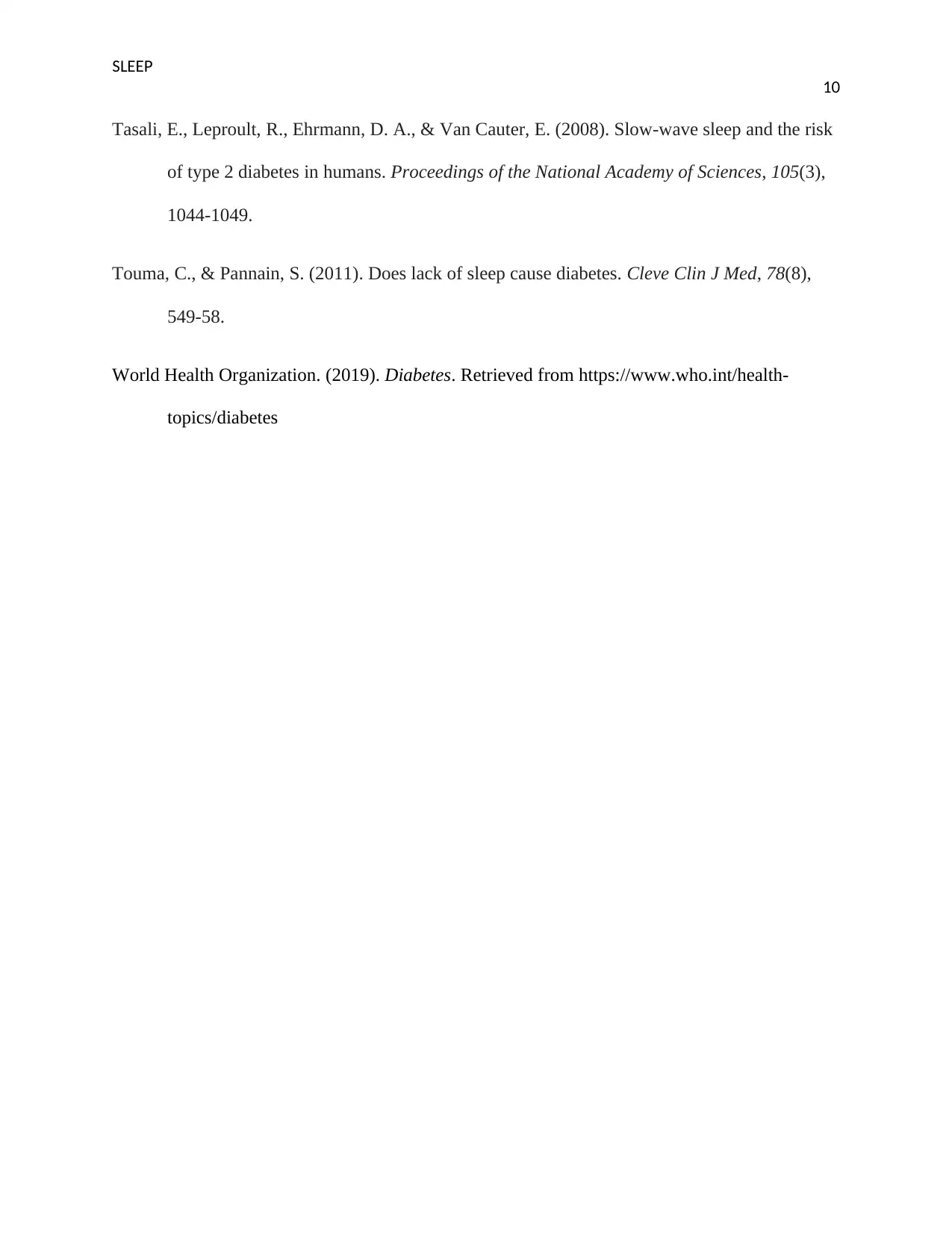
SLEEP
10
Tasali, E., Leproult, R., Ehrmann, D. A., & Van Cauter, E. (2008). Slow-wave sleep and the risk
of type 2 diabetes in humans. Proceedings of the National Academy of Sciences, 105(3),
1044-1049.
Touma, C., & Pannain, S. (2011). Does lack of sleep cause diabetes. Cleve Clin J Med, 78(8),
549-58.
World Health Organization. (2019). Diabetes. Retrieved from https://www.who.int/health-
topics/diabetes
10
Tasali, E., Leproult, R., Ehrmann, D. A., & Van Cauter, E. (2008). Slow-wave sleep and the risk
of type 2 diabetes in humans. Proceedings of the National Academy of Sciences, 105(3),
1044-1049.
Touma, C., & Pannain, S. (2011). Does lack of sleep cause diabetes. Cleve Clin J Med, 78(8),
549-58.
World Health Organization. (2019). Diabetes. Retrieved from https://www.who.int/health-
topics/diabetes
1 out of 11
Related Documents
Your All-in-One AI-Powered Toolkit for Academic Success.
+13062052269
info@desklib.com
Available 24*7 on WhatsApp / Email
![[object Object]](/_next/static/media/star-bottom.7253800d.svg)
Unlock your academic potential
Copyright © 2020–2026 A2Z Services. All Rights Reserved. Developed and managed by ZUCOL.





